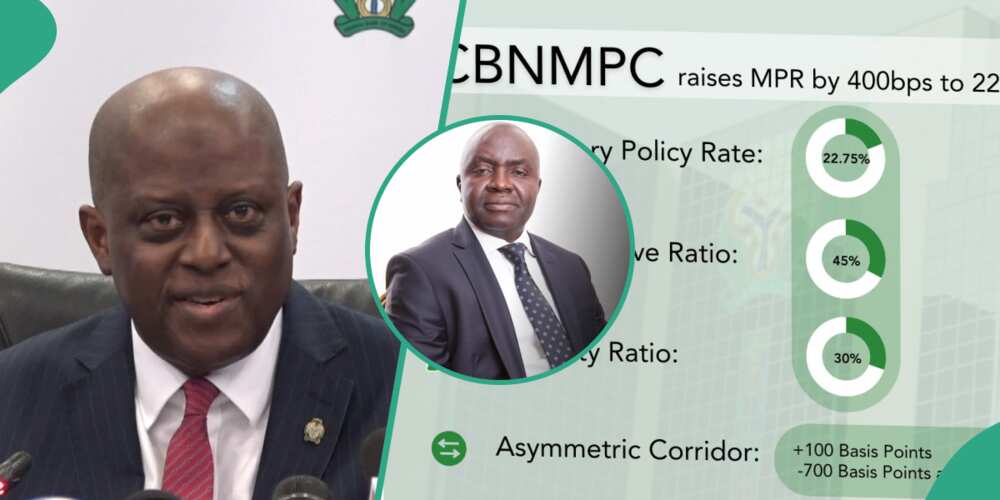“It Will Affect Businesses”: Expert Speaks As CBN Increases Interest Rate to 22.75 Percent
- The Central Bank of Nigeria, through its Monetary Policy Committee (MPC), announced a new interest rate
- The new benchmark interest rate has been increased by 4.00 percentage points, from 18.75% to 22.75%
- Nigerian economist Muda Yusuf, who is also the CEO of the CPPE explained to Legit.ng the impact of CBN MPC's decision
PAY ATTENTION: The 2024 Business Leaders Awards Present Entrepreneurs that Change Nigeria for the Better. Check out their Stories!
Legit.ng journalist Dave Ibemere has over a decade of business journalism experience with in-depth knowledge of the Nigerian economy, stocks, and general market trends.
The Central Bank of Nigeria (CBN) has increased the interest rate to 22.75% from the 18.75 per cent it was increased to in July 2023.

Source: Facebook
The Governor of the CBN, Yemi Cardoso, disclosed this while addressing journalists at the end of the two-day Monetary Policy Committee (MPC) meeting in Abuja on Tuesday, February 27, 2024.
The CBN also increased CRR and the Liquidity ratio, Punch reports.
PAY ATTENTION: Share your outstanding story with our editors! Please reach us through info@corp.legit.ng!
Expert reacts
Reacting to the development, Muda Yusuf, the CEO of the Centre for the Promotion of Private Enterprise (CPPE), told Legit.ng that the decision by the CBN could potentially constrain the capacity of banks to support economic growth and investment, especially in key sectors.
He also added that the increases could hamper the financial intermediation role of banks, making it more challenging for businesses to access credit.
Yusuf also criticised the decision, noting that it failed to consider the unique challenges facing Nigeria.
His words:
"The outcome of the Monetary Policy Committee [MPC]s meeting of 27th February 2024 would hurt the real sector of the economy which is already contending with numerous macroeconomic challenges.
"The increase of Monetary Policy Rate [MPR] from 18.75% to 22.5%; and cash Reserve Ratio [CRR] from 32.5% to 45% pose a major risk to the financial intermediation role of banks in the Nigerian economy.
"The increase would constrain the capacity of banks to support economic growth and investment , especially in the real sector of the economy because the increases are quite significant."
"Although the decision was consistent with the typical policy response of the Central Banks globally, it failed to reckon with domestic peculiarities.
"The key drivers of Nigeria inflation are largely supply-side variables, and the CBN ways and means financing.
"Over the last two years, there had been persistent monetary policy tightening, yet there has not been any significant impact on the inflationary pressures. If anything, the general price level had been continuously on the increase."
Yusuf emphasized the need for the Central Bank to focus on increasing the capitalisation of development finance institutions to provide concessional financing for the real sector and small businesses.
He also called for reforms to address the root causes of inflation, including addressing foreign exchange scarcity, supply chain disruptions, security concerns affecting agricultural output, and high transportation costs.
"Already, bank lending has been constrained by the high CRR which was until the latest review, 32.5% [many operators in the sector claim that effective CRR is as high as 50% for many banks], the discretionary debits by the apex bank.
"The credit situation in the economy is already very tight, with lending rate ranging between 25 -30%.
"The Nigerian banks are yet to live up to their financial intermediation role because of these constraining factors.
"The new dramatic increase in MPR to 22.5% hike means that the cost of credit to the few private sector that have exposure to bank credits will increase which will impact their operating costs, prices of their products and profit margins, amidst vey challenging operating conditions."
CBN releases new BDC operational guidelines
Earlier, Legit.ng reported that the Central Bank of Nigeria (CBN) has announced rules that will see the end of the sale of dollars on the street in Nigeria.

Read also
Boost for naira as CBN successfully pays additional $400 million to foreign airlines, others
The New guidelines issued for BDC operators are aimed at streamlining their operations and enhancing regulatory oversight.
CBN hopes these measures will help create stability for the naira and transparency of the foreign exchange market.
PAY ATTENTION: Donate to Legit Charity on Patreon. Your support matters!
Source: Legit.ng



